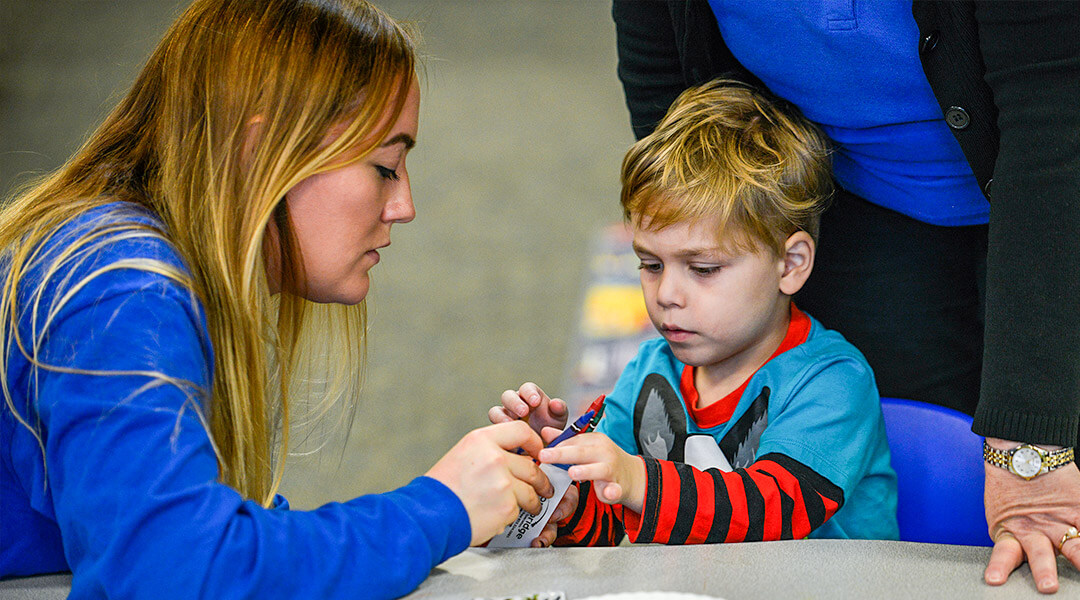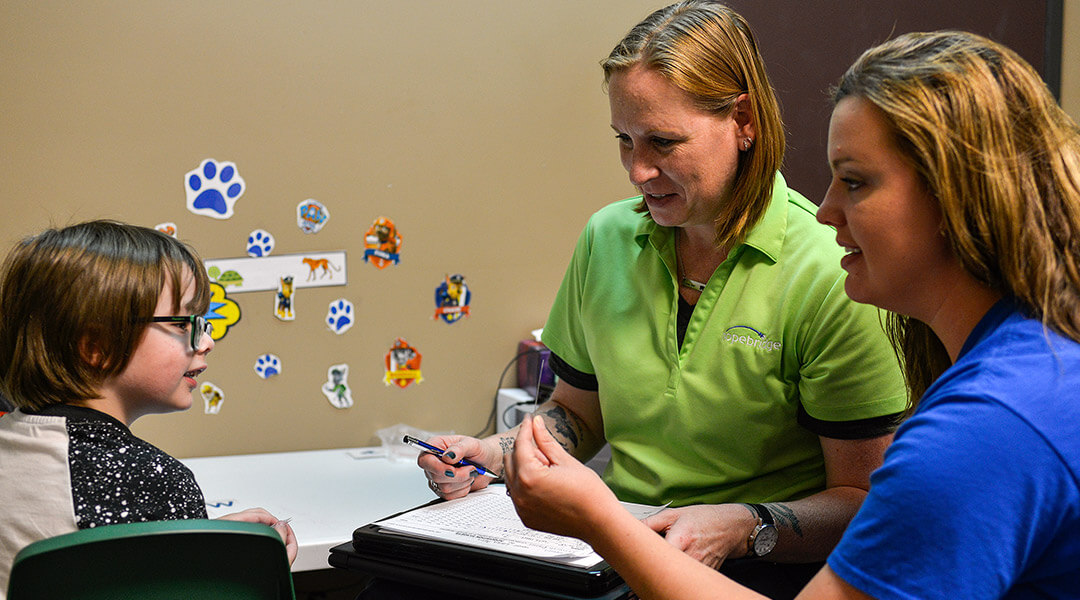
Frequently Asked Questions about Autism Testing and Diagnosis
Diagnostic and Testing Services
Does my child really need an autism diagnosis?
Early intervention begins with identification. Your child will need a diagnosis for us to be able to start the treatment process, whether it is for autism or another developmental delay*. It’s important to help us identify the specific difficulties your child is having, as well as required for insurance authorization, should you choose to pay for services through your insurance provider. Luckily, we have our very own Hopebridge Diagnostics Team to help you through the autism testing process, who you can get in touch with by clicking here.
*Children under the age of 5 with Arizona Medicaid (MercyCare, AZ Complete, Banner Health, and United Health Community Plan) that need ABA therapy verified by medical necessity are not required to obtain or provide an autism-specific diagnosis in order to begin therapy. Our Care and Benefits Team will walk you through requirements if your child is eligible.
Can you recommend anyone to provide an autism diagnosis?
We have a special Hopebridge Diagnostics Team of licensed psychologists that can provide an assessment. To make an appointment for a test, please get a referral from your child’s pediatrician and call us at (855) 324-0885, or you can fill out the form here and we will help you with the process.
What is involved in the diagnostic evaluation?
At Hopebridge, once we have a referral and insurance verification for your child, we can set up an appointment for the evaluation. The assessment itself may vary from child to child, depending on a few different factors related to the individual being evaluated, such as speech level and age. It will include age-appropriate activities administered by a psychologist and designed to bring out behaviors and social characteristics associated with autism spectrum disorder. If the child is verbal, it will also include evaluating speech and language patterns. To a parent, much of this will look and feel like the child is engaged in play and problem-solving activities. It takes approximately one hour to administer, plus around 15 minutes for the psychologist to score.
How long does the diagnosis process take?
At Hopebridge, once we have a referral and insurance verification (in which our Care and Benefits Coordinators can assist you to obtain), the evaluation process for an autism diagnosis can be accommodated within as little as 45 days. Our wait times are often up to six months earlier than other local options. During the appointment, the evaluation itself requires approximately one hour to administer.
How long does it take to get tested and diagnosed with autism spectrum disorder?
Once we receive a referral from your physician, our team will contact you within 48 business hours to get you started by verifying basic information. While the diagnostic process timeline can vary between families based on insurance and other factors, at Hopebridge, we can set up an appointment often up to six months sooner than other providers…often within 45 days. From there, the diagnosis appointment takes approximately 2-3 hours (including a 1-hour assessment), and your family will receive answers immediately. Our clinical psychologist will walk you through the determination and assist in the next steps of services.
My son or daughter matches all the symptoms of autism, but doesn’t have an official diagnosis of autism spectrum disorder. Can I sign them up for ABA therapy?
Your child needs a diagnosis for us to be able to start the treatment process. It’s important to help us identify the specific difficulties your child is having, as well as required for insurance authorization, should you choose to pay for services through your insurance provider. Luckily, we have our very own Hopebridge Diagnostics Team to help you through the process and testing, who you can get in touch within a Hopebridge center near you.

Frequently Asked Questions about Applied Behavior Analysis (ABA Therapy)
Applied Behavior Analysis (ABA Therapy)
How does ABA work?
Applied Behavior Analysis is a scientific, behavioral management approach. By utilizing basic principles of behavior, special techniques and positive reinforcement it can bring about significant, measurable change. It’s a way to shape and mold actions for effective communication and learning. ABA methods help children replace hindering behaviors so they learn “what to do” not just “what not to do.” Some of the activities that promote learning are social interactions between peers and adults, functional communication to build or increased language, adaptive living; such as transitioning, daily living skills, feeding and toileting.
How often does my child need ABA therapy?
Evidence shows consistent and comprehensive therapy over five days per week yields the best clinical outcomes. Hopebridge specializes in therapy for children who meet the criteria for both full- and part-time schedules in order to meet this need. Our team of experts will provide clinical recommendations for the number of hours per week needed for therapy, which it uses to create a schedule that is right for your family. Our team will then connect with your child’s physician for authorization, as well as provide insurance support to assist in coordinating coverage. Here are some standard schedules to give you an idea of what to expect:

What happens during an ABA therapy session?
The inside of a therapy room is where fun meets learning! Each child is unique in their needs and what motivates them to learn. We hone in on what your child loves and teach them to manipulate the environment around them to learn and acquire new and meaningful skills. Through the use of Natural Environment Teaching, our therapist are on the floor and assist your child in navigating and learning new things around them. Learning through positive reinforcement is how Hopebridge teaches your child to acquire and retain new and old skills!
How long does it take before my son or daughter can start ABA therapy?
Once your child receives an autism diagnosis, you can work towards getting them Applied Behavior Analysis. Upon receiving a diagnosis through Hopebridge, your paperwork will be submitted to our patient intake department and we work with you to schedule evaluations for your chosen center’s available services, such as ABA, speech and occupational therapy. If your child already has a diagnosis from an external provider, you will first need a referral, which you can submit through your physician or our website.
ABA evaluations are typically scheduled 1-2 weeks out, depending upon insurance verifications. These evaluations are approximately 2 hours in length and cover a variety of different assessments. After all paperwork is submitted from there, it can take up to 45 days for insurance to review and approve hours, plus make sure the proper resources are in place.
I see mixed reviews about ABA. How effective is it?
Applied Behavior Analysis (ABA) is the only treatment that is scientifically proven to be effective for autism spectrum disorder. ABA therapy has a high success rate with 40% of children making improvement and 47% gaining functionality. It is also endorsed by the U.S. Surgeon General, the National Institutes of Health, the American Academy of Pediatrics and the American Psychological Association.
How long is a therapy session?
Frequency and duration of therapy is individually determined by the results of your child’s evaluation. We specialize in working with children who need a total of 16 to 40 hours per week of therapy. For this group, typical ABA therapy sessions range from 4 to 8 hours per day. Speech and occupational therapy typically cover 30 to 60 minutes.
What ages does Hopebridge treat?
To build the greatest impact, we concentrate on early identification and early intensive behavioral intervention. As such, we primarily focus on diagnoses and ABA therapy services between the ages of 15 months to 9 years, but offer services to children up to age 10.
Are you hiring BCBAs?
Yes! If you’re interested in becoming a BCBA or joining one of our other therapy teams, we’re looking for more caring people to help support our kiddos. You can apply here or visit us online to learn about the benefits of working at Hopebridge as a BCBA.

Frequently Asked Questions about Hopebridge 360 Care Autism Services
Hopebridge 360 Care
How do you determine my child’s therapy plan and schedule?
Once your child receives an autism test and diagnosis through Hopebridge and/or physician referral, our patient intake department will work with you to schedule evaluations for the center’s available therapies, such as ABA, speech, occupational therapy. Once the evaluations are complete, our licensed therapists will analyze results, review medical information from your child’s pediatrician, consult with the Care and Benefits team on coverage, and communicate with you on goals, challenges and more in order to craft a personalized plan and schedule that is the best fit for your family’s success.
Is it possible to have multiple therapy sessions in one day?
Absolutely! That that is the beauty of Hopebridge 360 Care. If your child’s program calls for multiple therapy options, such as ABA and occupational therapy, our centers that offer those services can accommodate you. Hopebridge is built around our multidisciplinary approach to therapy and we’ll do everything we can to build the best schedule for your family. Visit our centers page to view the available services near you.
I’m worried my child won’t ever speak, will this therapy enable my child to talk?
Even if your child is not verbal, it doesn’t mean that he or she is unable to communicate. At Hopebridge, it is our goal to help your children find “their voice” and effectively communicate their wants in and needs in a way that best suits them. Utilizing alternate forms of communication such as PECS (e.g. Picture Exchange Communication), gestures, sign language and augmentative devices (such as iPads) help your child navigate through language and finding their voice. Complementing therapies like Applied Behavior Analysis (ABA), speech and occupational therapy can all be used to shape your child’s sounds into language over time, as they are ready.
Am I allowed to be involved in my child’s therapy?
Of course! ABA therapy is most effective for children with autism when parents get on board. Our BCBAs will design a personal development plan for your child that includes parent training and family education. From goals designed with your input, to tips and advice on how to help reinforce the ABA process at home, caregivers are an integral part of our program.
What goals do you set for the children?
Goals and programs at Hopebridge are customized for each child, taking into consideration the needs and wants of each family. Each child with autism is different and has different needs, behaviors and challenges, which is why our expert BCBAs and interdisciplinary therapy teams design a personal development plan for each kiddo at Hopebridge.
How long is a therapy session?
Frequency and duration of therapy is individually determined by the results of your child’s evaluation. We specialize in working with children who need a total of 16 to 40 hours per week of therapy. For this group, typical ABA therapy sessions range from 4 to 8 hours per day; and speech and occupational therapy typically cover 30 to 60 minutes.
What ages does Hopebridge treat?
To build the greatest impact, we concentrate on early identification and early intensive behavioral intervention. As such, we primarily focus on diagnoses and ABA therapy services between the ages of 15 months to 9 years, but offer services to children up to age 10.

Frequently Asked Questions about Insurance and Funding for Autism Services
Insurance/Funding
Will my insurance cover the testing for a diagnosis?
If you make an appointment with the Hopebridge diagnostic Team at one of our centers and have a plan with one of our participating payers, our Care and Benefits Coordinators can work with you to provide an insurance-recognized assessment for your child. Should you choose to go to another clinician, coverage varies by healthcare provider, so insurance coverage may not be guaranteed. Visit our Insurance Support page for more information.
I’m not sure I can afford ABA, how much does it cost?
If you have health insurance, Hopebridge bills the insurance company on your behalf. From there, your child’s specific plan will determine any contracted discounts or out-of-pocket costs.
How many service hours will we be approved for?
Coverage is based on medical necessity and ranges from 10 to 40 hours. Our team will submit your plan of care to the insurance company or Medicaid provider and they will review and let us know what is covered.
What do I have to pay out of pocket for services?
The out-of-pocket cost varies by plan. We first run a benefit check to determine what portion insurance will cover and what you will be responsible to pay, based on factors like the deductible, co-insurance and the annual out-of-pocket maximum.
What if my commercial insurance policy doesn’t cover ABA services?
The good news is coverage for ABA is increasing, and if you do not have it, there are alternatives you can pursue. If you do not have primary insurance coverage for ABA, it may be possible to obtain coverage through a marketplace supplemental plan or Medicaid supplemental plan.
What insurance providers work with Hopebridge?
Hopebridge works with a range of commercial insurance companies and Medicaid, which varies from state to state. For the full list of participating payers by state, click here. To help you navigate everything, our Hopebridge Care and Benefits Coordinators are available throughout the insurance process.
Are autism services covered through the Affordable Care Act (ACA)?
All of the states we serve in offer insurance through their state marketplaces, which are commonly known as Obamacare. Hopebridge’s Care and Benefits Coordinators can help you determine the autism benefits available to you through your specific plan.
Do you accept Medicaid?
Yes, we accept Medicaid at Hopebridge through a range of preferred payers. Please contact us and we’ll have one of our Care and Benefits Coordinators work with you to iron out the details.
How do I apply for the Medicaid waiver?
Certain states offer Medicaid waivers based on income and clinical criteria. Caregivers should submit their child’s diagnostic paperwork to the state’s Medicaid or disability coverage in order to apply for additional coverage. We recommend visiting your state’s Medicaid website to find out more information.
Do I make my copay daily at the center?
Hopebridge does not ask for copays on a daily basis, and rather provides an invoice at the end of each month.

Frequently Asked Questions about Ages Served at Hopebridge
Ages Served
What is the earliest my child can receive an autism diagnosis?
Hopebridge focuses on early identification. Our diagnosticians conduct autism tests for children as young as 15 months of age.
What age range does Hopebridge serve?
To build the greatest impact, we concentrate on early identification and early intensive behavioral intervention. As such, we primarily focus on diagnoses and ABA therapy services between the ages of 15 months to 9 years, but offer services to children up to age 10.
Why is a teenager not the best fit for Hopebridge therapy?
While Hopebridge’s autism therapy centers are designed to meet a range of ages, abilities and challenges, the programs and materials are geared toward early intervention and therefore best equipped for those younger than 9 years of age. In addition, the majority of children in our centers fall within this younger age range, so peer interaction for older kids and teens may not be the best match. To help as many children build independence as possible, we do make special considerations for those 10 years old.
If you are seeking more information for a teenager who may have autism, Autism Speaks offers some great adolescent-focused toolkits, covering everything from sleep strategies to puberty. The Autism Society and American Academy of Pediatrics (AAP) are also good resources.
At what age will my child no longer be able to receive services at Hopebridge?
Children who receive ABA therapy and other autism services at Hopebridge are never discharged based on age.
